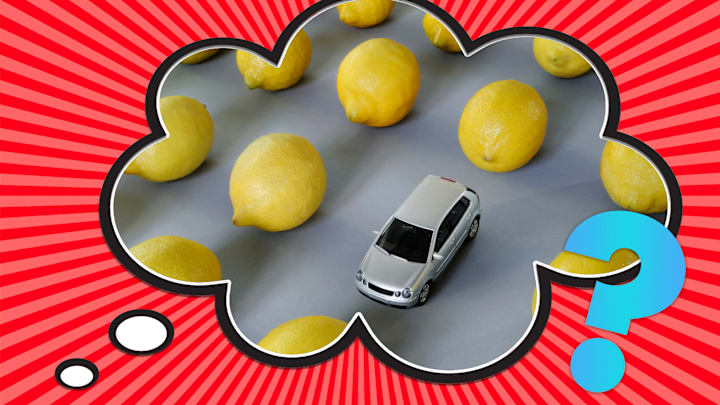Shopping for a car, new or used, can be a nerve-wracking experience. If you buy new, you risk sticker shock and dealer add-ons. Purchase used and you’re never quite sure if your new vehicle will turn into a headache 10 miles down the road.
In the latter case, we sometimes refer to defective cars as “lemons.” States even refer to their consumer protection bills against crummy cars as “lemon laws.” But why do we associate a death trap with a tangy fruit?
According to Green’s Dictionary of Slang, using lemon to denote a fraudulent or worthless purchase dates back to 1909; its use in reference to cars specifically goes back to 1923, when one used car dealer profiled in The Oakland Tribune is said to have “congratulated himself upon having rid himself of a lemon finally.” Lemon as a noun or adjective has often been associated with something unpleasant or unpalatable—as some people find the tartness of the lemon to be—or something that’s turned sour.
The car-lemon connection may have been cemented with an ad Volkswagen ran in the 1960s. Like most of their minimalist advertising from the period, it consisted of a photo of a car and a stark caption: “lemon.” The copy goes on to say that Volkswagen’s quality inspectors had caught several flaws with this particular car, ensuring it didn’t arrive to a dealership with those blemishes intact.
“We pluck the lemons,” the ad concluded. “You get the plums.”
It wasn’t until 1975, though, that consumers had federal lemon protection. The Magnuson Moss Federal Trade Commission Improvements Act guaranteed consumers wouldn’t be stuck with a faulty consumer product, including cars, or suffer unreasonable warranty terms.
The law applies to consumer items of all types, though cars were of particular concern as they’re often the most expensive item prone to mechanical failure a person can buy. It quickly became known as “the lemon law,” though it really refers more to the warranty of the vehicle than the vehicle itself.
In New York, for example, state law says that a new car must conform to the manufacturer’s warranty and that, if repair cannot be made within a reasonable number of attempts, the purchaser is due a refund.
The lemon laws can vary by state and by vehicle condition, so it’s important to know which rules apply. It’s also crucial to get an inspection and pull a motor vehicle history report when buying used and to pay attention to what a dealer’s window sticker might say about a vehicle being sold with a guarantee or as-is.
There is one situation where having a lemon can pay off—sort of. According to analysts at iSeeCars, who examined used car prices against the MSRP of a new car, one color had the lowest depreciation at 4.5 percent, far lower than the average of 15 percent. That color? Yellow.
Have you got a Big Question you'd like us to answer? If so, let us know by emailingbigquestions@mentalfloss.com.
